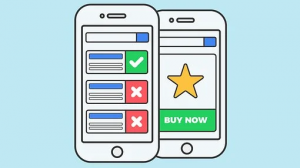eCommerce is one of the fastest-growing industries, and it’s not showing signs of slowing down anytime soon. The recent COVID pandemic has pushed thousands of businesses from traditional brick-and-mortar shops to online platforms, making the competition much harder than it ever was.
If you’re trying to optimize your online store and ensure that you thrive in a digital environment, you should make your site as unique as possible. This article will give you a few design tips that will help you gain a competitive edge in the digital space.
1. Put Your Brand In The Spotlight
There is an unlimited list of eCommerce platforms where people buy items every day. You probably already know that most of them look generic, and that’s something you want to avoid. A website without clear branding and a recognizable design won’t last more than a few months. What’s more, platforms like that can’t help you grow a business or become a leader in your industry.
It doesn’t matter how good your offers are, if you don’t present them in the right way, your website won’t be able to attract customers for long. That’s why you need a website with clear branding, easy navigation, and plenty of product information. Branding is the key to success for any eCommerce site, so make sure that your customers know what they are buying and who they are buying it from.
If you’re struggling to figure everything out by yourself, get in touch with one of the top web design companies, and experts will show you how to brand your website according to the latest trends.
2. Keep It Simple
Imagine landing on a website to buy something only to realize that you don’t know where to click to get to what you want. Some website owners want to implement all kinds of features, so much so that they forget about the importance of keeping things simple.
No one wants to buy from an eCommerce platform that makes it complicated to make a purchase. The simpler the navigation is, the more success your site will have.
Adding too many features to your website will increase page loading times and harm your SEO. The best thing to do is to provide a limited number of high-quality products and make the user experience as simple as possible. Streamline all options and declutter product pages to make it easier for your customers to find what they need and purchase it.
3. Utilize The Power Of Visual Elements
Buying online means that your customers won’t get the chance to see and feel the items in your offer before they buy it. Since you can’t offer your customers the chance to try something on, the next best thing is to provide high-resolution photos, product videos, and possibly a 3D model of every product.
The Baymard Institute concluded that a quarter of eCommerce websites still don’t offer high-quality product images, which gives you a good place to start when building your website.
The ideal approach is to create 3D models users can rotate so they can view the product from all sides. According to our friends from the best web design company in New York, high-quality images and product videos have a significant effect on customer purchasing decisions and customer satisfaction.
4. Implement Omnichannel Customer Support
Some of your customers will need help to follow through with a purchase. They might have a few questions about the checkout process, or they may want to ask for more information about the product. Making sure that they have the option to get in touch with your customer support team will help you go a long way in growing your company.
Include a FAQ page, provide your business email, phone numbers, and HQ location at the end of every page, and incorporate a live chat feature. You want to make sure that every customer gets what they need, as soon as possible.
This will have a positive impact on customer retention and relationship quality. Once your customers know that you’re willing to go the extra mile to help them, they will gladly share their experience with friends and family members. It’s a win-win situation for everyone involved.
5. Don’t Forget About Social Proof
We touched a little bit about this when we talked about using photos and videos on product pages, but you should include a few testimonials and product reviews as well. We’re not talking about generic reviews you can write yourself. We mean real user-generated reviews with real opinions.
Most online shoppers will Google your brand and products before making a purchase, so make things easier by adding review information directly to your product page. Think about the information you would want to see when you’re shopping on an eCommerce platform, and you can’t go wrong.
Summing It Up
There are a ton of methods you can use to create a recognizable eCommerce platform. The five tips above are just the tip of the iceberg. You should also make sure that your site is fully responsive, it has personality, and that your branding is consistent throughout the entire user experience.
However, since the trends are changing quickly, you might want to consider contacting a professional web designer to ask them for guidance on your next move. With a little bit of hard work, a creative presentation, and high-quality images, you can make your website more appealing to a wider audience.







